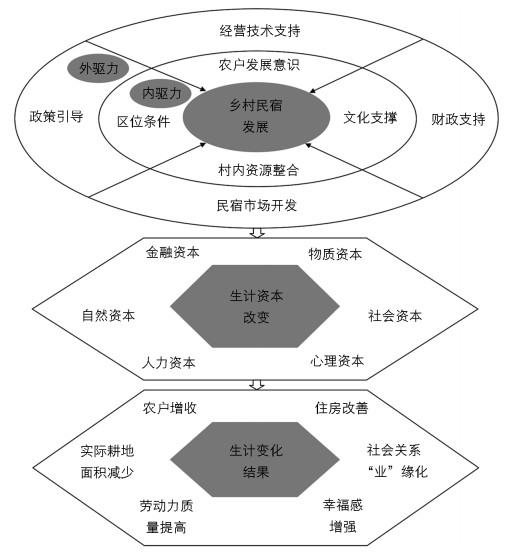-
农民生计问题涉及众多学科,受到各国政府、学者和社会公众等的持续关注. 农村贫困是多数发展中国家正面临的棘手问题,城乡差距不断拉大[1]. 乡村旅游对减贫效果显著[2],发展乡村民宿逐渐成为促进农户生计可持续性转型的重要影响因素[3],是改善农民生活和乡村振兴战略顺利实施的重要途径,受到国家的高度关注. 2018年9月,中共中央、国务院在“乡村振兴战略规划(2018-2022年)”中提出“合理利用村庄特色资源,发展乡村旅游和特色产业,形成特色资源保护与村庄发展的良性互促机制”;2019年的中央一号文件(中发〔2019〕1号)要求“发展适应城乡居民需要的休闲旅游、餐饮民宿、文化体验、健康养生、养老服务等产业”. 同时,各地政府相继发布文件促进农户生计改善,重庆市人民政府办公厅“关于加快乡村旅游发展的意见”中指出,要坚持依靠“三农”,为“三农”培育具有地方特色的乡村旅游产品;浙江省多地对乡村民宿实施扶持奖励政策,助推乡村振兴. 目前,尽管我国所有的贫困县都已经全部实现脱贫摘帽,进入到全面实施乡村振兴的阶段,但仍存在诸多返贫风险,需要从“输血”转向“造血”,实现农户生计可持续性发展.
乡村旅游是我国社会主义新农村建设的绿色实践模式之一[4],在全国旅游中的占比从2010年的不到20%增加到2015年的55%[5],乡村民宿旅游则是生计多样化和增加收入的有效方法[6-7]. 近年来,关于乡村旅游对农户生计影响的研究成果较为丰富,这些研究选择发展中国家、欠发达地区或者较为贫困的农村为研究区域[8-9],主要采用参与式农村评估法[10]、问卷调查法[11]、logistic模型回归[12]、描述性统计分析法[13]等开展研究,研究内容多集中于如下3个方面:①乡村旅游对农户生计资本与生计转型的影响. 生计资本是构成生计结构的基础要素[14],乡村旅游作为一种新的生计,带动了农户生计资本的多样化及农户生计的现代化,如现代化的住房和现代化的生活方式[15]. 多数学者采用英国国际发展署提出的可持续性生计分析框架构建农户生计评价体系,量化分析农户生计资本[16];部分学者对传统的可持续性生计分析框架进行改造,以提高可持续性生计框架与旅游的结合度[17]. ②乡村旅游生计的多重效应. 发展乡村旅游,通过产业转型影响农户的生计结果,当农户生计策略向旅游型生计转型后可较大程度地增加农户家庭收入,促进生计的可持续性[18-19],农民对生活的满意程度也会提高[20]. 乡村旅游生计有正面效应也有负面效应,后者如土地撂荒[21]、邻里关系恶化和贫富差距拉大等[12],而且旅游型生计也会面临季节性和市场有限等新威胁[22]. ③乡村旅游地的农户生计脆弱性. 由于乡村旅游被作为乡村脱贫的重要途径,众多研究主要以生态环境脆弱地区[23]、异地移民搬迁地[24]等为研究区域,重点关注乡村旅游与农户生计脆弱性关系,认为对乡村旅游依赖性越强,农户生计就越具有脆弱性[25],因此,农户生计不应过度依赖单一生计方式.
综上可见,农户生计研究的视角丰富,但这些研究多从整体上探讨乡村旅游发展对农户生计的影响,关于乡村民宿对农户生计资本影响的研究有待深化和细化. 基于此,本文在借鉴已有研究的基础上,应用可持续性生计分析框架,构建基于乡村民宿的农户生计资本评价指标体系,对重庆市6个典型民宿村发展乡村民宿前后的农户生计资本变化特征及其影响因素进行分析,以期为探寻基于乡村民宿产业实现可持续性的生计策略选择提供参考.
HTML
-
重庆市的区域和城乡发展差异显著,在其“一区两群”的空间结构中,主城都市区经济增长迅速,渝东南武陵山区城镇群是国家重点生态功能区、武陵山区文旅融合发展示范区以及少数民族聚居区,渝东北三峡库区城镇群是长江上游重要生态屏障. 可见,重庆市“两群”地区保生态和促发展的矛盾突出,乡村振兴的路径也与其他地区不同. 本文选取位于渝东南武陵山区城镇群的武隆犀牛寨、彭水樱桃井村、酉阳两罾乡内口村和渝东北三峡库区城镇群的巫溪茶山村、巫溪长红村、城口兴田村共6个民宿村作为案例样点,其中部分民宿点是重庆市巴渝民宿集团有限公司利用当地旅游资源优势发展的乡村民宿旅游点. 不同的民宿村有不同的旅游开发治理方式,对农户生计有不同的影响,但总体上都是政府主导型(如巴渝民宿主要由巴渝民宿集团公司投资建设,该公司由重庆市规划和自然资源局组建成立,属于国有企业)乡村民宿发展模式(表 1).
-
本文数据资料主要来自课题组对案例地的2次调研,其中2020年8月前往武隆犀牛寨、彭水樱桃井村、酉阳内口村,2020年11月前往巫溪茶山村、巫溪长红村和城口兴田村开展实地调研. 调研以经营乡村民宿的农户为调研对象,采用半结构式访谈、问卷调查及小型座谈会的方式获取所需数据,每份问卷调查时间为30~60 min,问卷调查内容主要包括农户家庭基本情况、经营民宿前后的生计资本情况、民宿经营情况,其中农户在经营民宿前后的生计资本情况主要依据自然资本、人力资本、社会资本、物质资本、金融资本和心理资本进行问卷设计. 共获得129份问卷,其中有效问卷127份,有效率达到98.45%.
-
为使变量具有可比性,对生计资本相关数据采用李克特5级量表法进行处理,反映发展乡村民宿前后农户生计资本指标的变化情况;考虑到各类指标有不同量纲,采用极差标准化法进行无量纲化处理,使所有指标在标准化和等级赋值之后的值都在0~1之间,标准化步骤如下:
式中:Xij和Yij分为正项和负向指标标准化后的值;xij为第i个样本第j个指标;xmax和xmin分别为第j个指标的最大值和最小值.
1.1. 研究对象
1.2. 数据来源及处理
1.2.1. 数据来源
1.2.2. 数据处理
-
联合国环境与世界发展大会在20世纪80年代末明确提出可持续生计的概念,认为可持续生计是拥有维持基本生活的必需且充足的食物和现金储量及流动量[26]. 20世纪末21世纪初,可持续生计框架逐渐被建立起来[27-28]. 联合国开发计划署(UNDP)、国际关怀协会(CARE)和英国国际发展署(DFID)等分别提出了可持续生计分析框架,但目前应用最广泛的是英国国际发展署提出的可持续性分析框架(SustainableLivelihoodFramework,SLF框架).
发展乡村民宿是实施乡村振兴战略的重要手段. 由于发展乡村民宿前期需要大量财政和技术等的投入,其发展主要由政府、企业等联合带动,是一种“自上而下”的农民生计改善模式. 政府出台政策并给予财政支持,企业给予技术、资金、人才等的支持,在区位条件较好和地域文化特色鲜明的村落,通过整合村内资源发展乡村民宿. 可见,乡村民宿发展是通过内外驱动力的共同作用,推动农户生计资本储量的变化. 农户通过对生计资本的利用,转变生计策略,从而影响生计变化结果. 乡村民宿开发虽导致农户实际耕地面积减少但农户的收入显著增加,住房条件明显改善,幸福感加快提升,生计方式逐渐多元化,同时有关乡村民宿经营和管理方面的培训以及新的生活方式的形成促进了农户素质的明显提升,农户间的社会网络关系从血缘向“业”缘转变,农户旧有观念得到更新. 本文在借鉴DFID的可持续生计分析框架和相关文献[3, 27, 29]成果基础上,针对乡村民宿对农户生计资本变化的影响构建了乡村民宿发展-农户生计变化的分析框架(图 1).
-
本文采用综合得分法将指标权重与标准化均值加权平均,得到农户的各类生计资本指数以及生计资本总指数:
式中:L是发展乡村民宿前后农户生计资本总指数;Wj表示权重;Xij和Yij表示标准化值.
-
因本文需分析乡村民宿发展后农户生计资本的影响因素,因变量为乡村民宿发展后农户生计资本是否增加,其为二分类变量,所以采用二元Logistic回归模型. 二元Logistic回归模型为多元线性回归模型的推广,当该模型的被解释变量为二分类变量(1或0)时,多元线性回归模型解释变量xi对被解释变量y=1概率的预测为:
根据多元线性回归模型,当xi按每单位增加时,P将平均变化βi个单位. 本文从农户家庭基本情况、经营乡村民宿行为特征和乡村建设情况3个方面的变化分析民宿村农户生计资本增加的影响因素,所采用的二元Logistic回归模型公式如下:
式中:P是民宿村农户生计资本增加的概率,若p>0.5,民宿村农户生计资本增加,否则不增加;Z是xi的线性组合,公式如下:
变换后的公式如下:
式中:xi是民宿村农户生计资本是否增加的影响因素;β0是常数,β1,…,βi是估计系数,表示xi对P的贡献量.
2.1. 理论分析框架
2.2. 研究方法与模型选择
2.2.1. 综合得分法
2.2.2. 二元Logistic回归模型
-
本文在参考国内外关于生计资本评价指标体系研究成果[27, 30-31]的基础上,结合所研究的乡村民宿发展特征,构建乡村民宿农户生计资本评价指标体系,定量分析乡村民宿发展前后农户生计资本的变化情况(表 2).
自然资本是农户自然资源的储量情况,人均拥有耕地面积和实际人均耕种面积能分别表达出农户拥有的耕地储量及农户用于实现生产的耕地储量;物质资本是农户维持日常生活的物质设施,本文中的物质资本包括房屋、家禽数量、耐用消费品数量及生产工具数量;社会资本是农户可利用的社会资源,包括政府、大众等的社会资源和自身的人际关系,其中家庭中是否有人在村委会等单位上班及其人数影响了农户能否获得更多直接的社会资源;人力资本影响农户对其所有资本的运用情况,主要由家庭中劳动力受教育程度、数量、健康状况等表征;金融资本是农户能筹集并支配的资金,包括存款、收入、贷款等,本文选取农户家庭存款、贷款以及各类收入为金融资本指标;心理资本代表农户的心理期望和承受能力,反映农户在生计风险中能否顺利经营乡村民宿,本文选取农户幸福感指数和自信指数作为衡量心理资本的指标.
-
本文采用熵值法确定指标权重. 根据相关研究成果[32],考虑到发展乡村民宿前后农户生计方式的转变,各指标在农户生计资本整体评价中的相对影响程度发生改变,因此,在计算农户生计资本情况时采用不同的权重值. 为了使数据运算有意义,需消除指标为0的值,对无量纲化后的数据进行整体平移,即Xij=Xij+∝和Yij=Yij+∝. 为最大限度地保留原始数据的真实性,∝在本文中取值为0.000 1. 计算步骤如下:
首先,计算第j个样本第i个指标值的比重:
其次,计算第j个指标的信息熵:
最后,计算第j个指标的权重:
其中,m为样本数;n为评价指标值.
3.1. 民宿村农户生计资本评价指标选择
3.2. 民宿村农户生计资本评价指标权重确定
-
发展乡村民宿后,农户生计活动由以外出务工为主转向以经营民宿为主. 对发展民宿前后农户生计资本进行计算,结果(表 3)表明,在发展乡村民宿前后农户的生计资本总指数分别为0.184和0.261,均小于0.5,虽然农户生计资本总指数有所提高,但总体较低,发展潜力较大,多数农户缺资金、缺技术、缺管理能力等根源性问题没有得到完全解决,且乡村民宿发展时间较短,所带来的经济社会效益还未完全凸显出来.
-
自然资本是农户能够支配或使用的自然资源,如耕地资源等,发展乡村民宿后,农户的自然资本指数由0.043下降至0.010,在生计资本中变化率最大. 发展乡村民宿前,农户利用耕地较多,通常会种植玉米、土豆、红薯和中药材等. 发展乡村民宿后,一方面因为乡村民宿发展的需要,农户需适当集中居住,形成规模效应,因而主要通过易地扶贫搬迁和退耕还林等政策,以土地流转的方式集中建设乡村民宿,导致农户所利用耕地数量减少;另一方面由于农户需要投入时间经营乡村民宿,压缩了农民的农业生产时间,致使部分农户被迫进行流转甚至撂荒,农户实际耕种面积和耕种作物种类减少,以农耕为主的传统生计活动逐渐减少,农户大部分生产活动从农业生产转移到民宿经营.
-
物质资本指数由0.031增加到0.084,其中农户的耐用消费品数量和基础设施完善程度变化比较明显. 一是住房安全性和质量明显提高. 发展乡村民宿后,农房由土木结构向砖混结构转变,抵抗外界的破坏能力增强,但农户是将住房中除必要的生活起居需要以外的空间用作民宿经营,导致实际居住面积减少,堆放生产工具的空间被压缩或消失,生产工具数量减少;二是耐用消费品逐渐实现种类多样化和产品高级化. 电视机、冰箱和热水器等成为农户必备物品,由于研究区海拔较高,多为避暑胜地,农户对空调的需求较低;三是基础设施逐渐完善. 网络和夜间照明系统覆盖度不断提高,乡村道路逐渐硬化,商服设施和医疗卫生设施日趋完善.
-
外来支持与帮助推动了农户生活水平的提高. 在发展乡村民宿前,外界对乡村的帮扶较少,发展乡村民宿后,得益于扶贫政策和企业帮助,农民生活条件改善,居民面临困难时寻求帮助的途径增多,家庭人情往来礼钱支出变少. 原因是发展乡村民宿之后,部分村庄的农户通过易地搬迁等政策,搬到规划的乡村民宿经营区,农户互相之间不熟悉,且同为乡村民宿经营者之间存在一定竞争关系,导致农户之间关系淡化,逐渐疏远,旧有的邻里关系逐渐解体,以血缘为基础的邻里关系逐渐被以“业”缘为纽带的社会关系所替代,农户之间的人情礼金费用减少. 同时由于传统观念的更新和旧有习俗的改变,农户面临经营困难时多选择贷款等方法,而不是停留在变卖家产或向亲戚借钱方式上.
-
人力资本是6项生计资本中最复杂且最重要的一项,其质量高低影响生计策略的选择,从而影响生计结果的输出. 首先在发展乡村民宿后,农户成年劳动力受教育程度、劳动力数量以及劳动力健康状况略有提升,但变化不大,且多数农户文化水平较低,这也是影响乡村民宿可持续发展的一大障碍因素;其次农户在发展乡村民宿后,所接受的有关乡村民宿经营的就业培训次数明显增加,大多数家庭都参加过由政府或企业组织的培训,民宿经营能力和劳动力质量有了明显提高,同时多数农户也表示愿意参加培训,对培训效果感知良好.
-
发展乡村民宿后,农户的金融资本指数由0.065增加到0.068,资金保障能力有所提高. 农户进入乡村旅游相关产业之后,拓宽了收入来源渠道,为农民生活水平提高、财产增收提供了保障. 农户家庭人均年收入有所增加,但幅度较小,原因在于发展乡村民宿前,农户多以外出务工为主,务工收入比较可观;发展乡村民宿后,部分农户返乡经营民宿,外出务工收入减少甚至丧失,经营性收入增加,但由于民宿多处于起步阶段,产业链较短,主要以夏季避暑为主,盈利效果有待提升,所以农户家庭收入增长幅度不大. 同时部分农户会选择向银行贷款来经营民宿,贷款数量较多,面临的还款压力比较大;另外,在发展乡村民宿后,为降低餐饮成本、增加收入,部分农户通过销售土特产或畜禽的形式创造了一定的收入.
-
发展乡村民宿后,农户对生活的满意度提高,认为生活条件大大改善,且家人返乡创业,能常年陪伴在身边,生活幸福指数大大提高. 但由于发展乡村民宿这一新型生计策略存在一定风险,导致农户对未来发展不确定性顾虑增加.
-
根据相关研究结果[33-34]以及研究对象发展情况,本文以发展乡村民宿后农户生计资本是否增加为因变量,以农户家庭基本情况、农户经营乡村民宿行为特征和乡村建设情况等12个因素为自变量,通过相关性分析筛选出具有较强相关性或者具有显著影响的自变量(表 4).
从表 4中可以看出,在发展乡村民宿后,在众多影响因素中,家庭劳动力数量、房屋结构、获得外来支持以及基础设施完善程度对研究样点乡村民宿发展后农户生计资本有重要影响,这4项影响因素均与生计资本呈正相关,其中房屋结构的改善对生计资本增加的影响程度最为明显. ①家庭劳动力的数量增长会带动农户生计资本的增加,家庭中劳动力数量越多,可选择的生计活动越多,家庭收入将会显著提高. ②房屋结构的改善增加了农户生计资本储量,住房的现代化将直接提高农户的物质资本,同时在企业的帮助下,农户在新建或改建住房时较为注重传承优秀传统文化,增强了对游客的吸引力,也间接带来了民宿收入,增加了生计资本. ③政府的政策和财政支持以及企业的资金、技术和人员支持将带动农户的生计资本增长,如易地扶贫搬迁和土地流转等补助收入、企业帮助农户经营民宿的收入都将直接促进金融资本的增长. ④基础设施改善是乡村民宿发展的基础,道路的硬化、网络的覆盖以及商服设施数量增加等将直接增加生计资本的储量,同时也会促进乡村民宿的发展,增加农户的收入,改善农户的生计资本.
4.1. 农户生计资本的变化
4.1.1. 自然资本变化
4.1.2. 物质资本变化
4.1.3. 社会资本变化
4.1.4. 人力资本变化
4.1.5. 金融资本变化
4.1.6. 心理资本变化
4.2. 农户生计资本影响因素分析
-
1) 6个典型民宿村农户的生计资本指数明显增加,但总量不高,仍然有较大的提升空间. 生计资本指数从0.184增长至0.261,其中物质资本增长最为明显,农户的住房条件明显改善,收入结构趋于优化和多元化,改善了农户生计资本的储量和组合形式,为改进生计策略奠定坚实基础.
2) 农户生计由以外出务工为主向以经营民宿为主的乡村旅游兼业型和乡村旅游型方式转变. 家庭收入与支出增加,脱贫效果较为明显;公共服务、医疗等福利状况提升;同时旧有的邻里关系逐渐解体,以血缘为基础的家庭与邻里关系逐渐被以“业”缘为纽带的社会关系所替代,需要关注乡村的社会关系重塑.
3) 在乡村民宿发展后,家庭劳动力数量、房屋结构、获得外来支持以及基础设施完善程度对民宿村农户生计资本变化有重要影响,4项影响因素均与生计资本呈正相关,其中房屋结构的改善对生计资本增加的影响程度最为明显.
-
乡村民宿的发展改变了传统生计方式赖以生存的整体环境,促进了生计方式的转变,但如果将乡村民宿旅游中住宿和餐饮作为唯一的生计选择,未来可能会增加生计安全方面的风险. 因此未来农户生计的发展途径不应局限于住宿和餐饮,应延长产业链,适度丰富生产内容. 为了消除农户生计脆弱性,增强农户生计的可持续性,实现富美乡村的乡村振兴目标,提出如下对策建议:
1) 依托乡村发展需求延长产业链,助力乡村产业振兴. 以民宿业态为核心,延伸民宿产业链,针对不同群体及本地特色提供康养、观光、文化体验等活动;发展农产品加工企业、构建本地批发销售电商交易平台.
2) 拓宽融资渠道,吸引社会资本,增加农户金融资本和社会资本. 一是积极发挥政府的支持与引导作用,加大投资力度,将农业、旅游以及资源保护等方面专项资金向乡村民宿倾斜;同时通过“众筹”“PPP”等投融资模式吸引社会资本进入民宿发展市场,为进入企业提供便捷通道,适度给予优惠政策. 二是提高农户及村集体资金自筹能力,通过成立经济合作组织或由村委代理入市壮大集体资产.
3) 合理开发当地自然资源,保护生态环境,保护农户自然资本. 合理开发和利用当地农业资源和特色农产品,同时,严守生态保护红线和永久基本农田控制线,不侵占生态空间和农业空间,防止农户的自然资本进一步减少.
4) 加强农户经营管理等业务培训,将人力资源转化为人力资本. 不仅要增加业务培训次数,同时要丰富培训内容,通过全方位的培训,提高农户的素质,提高农户的经营管理能力,进一步提升乡村发展的内驱力.







 DownLoad:
DownLoad: